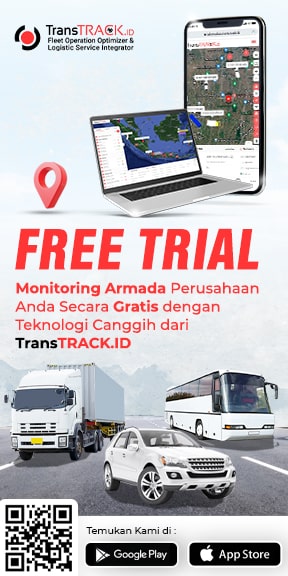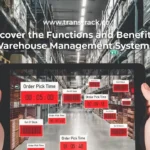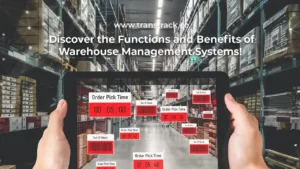Know the Types, Components, and Importance of Retail Warehouse for Businesses!
Posted on December 21, 2023 by Nur Wachda Mihmidati

A retail warehouse refers to a storage facility or warehouse associated with a retail business. These warehouses can be used to store stock items before they are moved to retail stores or to fulfill online orders. It is an essential part of the supply chain in a retail business, ensuring product availability and efficient inventory management. Check out the full article with TransTRACK!
The importance of retail warehouses for businesses
Retail warehouses play an important role in business operations. Here are some of the reasons why retail warehouses are so important:
Enhanced Storage Capacity
- Retail warehouses provide a large storage capacity for keeping products in stock. This allows businesses to manage inventory more effectively and deal with fluctuations in market demand.
- Adequate storage capacity also helps in tackling supply shortages and ensuring product availability when needed by consumers.
Efficient Operations
- With a well-organized retail warehouse, the process of receiving, storing, and releasing goods can be done efficiently. This minimizes lead times and allows businesses to respond quickly to changes in market demand.
- A good warehouse management system can also improve inventory accuracy and reduce the risk of lost or damaged goods.
Improving Security
- Retail warehouses help improve product security. Well-stored goods can be guarded against potential damage, theft, or other environmental factors that could compromise product quality.
- Security also involves controlling access to the warehouse to prevent loss or theft of goods, which can have a direct impact on business sustainability.
The importance of a retail warehouse is not only limited to the physical storage of goods, but also includes the implementation of modern technology and management systems to improve the efficiency, accuracy, and security of operations. An effective retail warehouse can be a valuable asset in ensuring smooth supply chain operations and retail business sustainability.
Types of Retail Warehouses
Here is a brief explanation of some types of retail warehouses:
Cooperative Warehouses
- A cooperative warehouse is a storage facility shared by several companies or merchants. Businesses participating in a cooperative warehouse usually share the rental and operational management costs.
- This approach can help small or medium-sized businesses to access larger storage facilities without the full cost burden.
Private Warehouses
- A private warehouse is owned and operated by a specific company or business to store their own inventory. This gives the warehouse owner full control over operations, security, and inventory management.
- Private warehouses are often used by large companies with significant stock volumes.
Public Warehouses
- A public warehouse is a storage facility that can be used by various companies or individuals. Item owners pay storage and service fees based on usage, making it more flexible than private warehouses.
- Public warehouses generally provide services such as goods receiving, storage, and dispensing.
Smart Warehouses
- Smart warehouses use advanced technologies, such as automation systems, IoT (Internet of Things), and data analytics to improve operational efficiency and inventory management.
- Automation systems in smart warehouses can include robotics, automated conveyors, and other smart devices to speed up processes and reduce human error.
- Smart technology also helps in real-time monitoring of inventory, predicting demand, and improving supply chain responsiveness.
Each type of retail warehouse has advantages and disadvantages, and the selection depends on the needs, scale of operations, and business strategy of a particular company.
Key Components in Retail Warehouse Effectiveness
The following components are key factors that greatly affect the effectiveness of a retail warehouse. Here is a brief explanation for each component:
Inventory Management
- Inventory management involves managing the quantity and type of goods stored in a warehouse. The goal is to ensure adequate product availability to meet consumer demand without unnecessarily increasing inventory costs.
- A good inventory management system involves real-time monitoring, demand forecasting, and the use of methods such as JIT (Just In Time) to minimize excessive stock.
Logistics of Returned Goods
- Managing returned goods is an important part of the retail supply chain. Retail warehouses need to have an organized process for receiving, inspecting, and managing returned goods.
- The logistics for returned goods involve processes such as receiving the goods, checking the quality, sorting, and determining whether the goods can be resold or need to be returned to the supplier.
Order Volume Planning
- Order volume planning involves estimating the number of products that need to be ordered to maintain adequate availability of goods. It involves a good understanding of demand patterns, sales cycles, and other factors that can affect order volume.
- Technologies such as enterprise resource planning (ERP) software and supply chain management (SCM) systems are often used to assist with order volume planning.
All of the above components are interrelated and require good coordination to achieve overall retail warehouse effectiveness. Good information systems, automation technology, and data analysis can also contribute greatly to improving efficiency in managing a retail warehouse.
In managing a retail warehouse, efficiency and accuracy are the keys to success. To ensure your warehouse operations run smoothly, we recommend implementing a reliable and trustworthy Warehouse Management System (WMS).
TransTRACK WMS has proven to be a superior solution in optimizing inventory management, improving operational efficiency, and providing full visibility into your supply chain. With advanced features such as real-time monitoring, inventory forecasting, and seamless integration, TransTRACK WMS can help your retail business achieve the highest level of effectiveness.
Don’t let the opportunity to improve your warehouse operations slip away. Contact us today for a free demo and discover how TransTRACK WMS can take your retail warehouse to the next level.
“Optimize Your Warehouse, Improve Your Business Efficiency with TransTRACK WMS!”
Topic :
 Bahasa Indonesia
Bahasa Indonesia








